Photographs: White House Photo by Pete Souza Shankar Acharya
Just over 18 months ago, Barack Obama became the first black (well, half-black) man to be sworn in as president of the United States, after having won the Democratic party's nomination in June 2008 and then having convincingly defeated his Republican opponent John McCain in the November elections.
In the early months of his presidency, Obama's approval rating in the Gallup polls was well above 60 per cent (65 per cent in May 2009). Since then it has dropped steadily, to 46 per cent by July 2010.
Interestingly, the ratings among blacks has held up close to 90 per cent throughout the past 18 months, while amongst Hispanics it has dropped by 20 percentage points and among whites by an even larger 24 points, from 62 per cent in January 2009 to 38 per cent in July 2010.
Less than two-fifths of white Americans now approve of Obama's presidential performance. With the Congressional mid-term elections barely three months away, a number of Democratic legislators are fighting shy of presidential visits to their districts, an astonishing reversal from the situation in the autumn of 2008.
Does this remarkable slide in the polls reflect an objective assessment of Obama's performance in his year-and-a-half as president? I don't believe so. ...
Obama inherited a mess
Image: President Obama meets with administration officials during a terrorism threat briefing in the Situation Room of the White HousePhotographs: White House Photo by Pete Souza
Let us consider a summary (and inevitably selective) assessment of his achievements and failures during this short period.
To state the obvious, Obama inherited a mess, including, notably, the biggest financial crisis since 1930 and a consequent major recession with risks of it snowballing into a serious economic depression, two ongoing foreign wars (Iraq and Afghanistan) with uncertain outcomes, difficult relations with both adversaries (such as Russia, Iran and North Korea) and allies (such as Europe and Pakistan), a growing fiscal deficit and unresolved, long-term challenges in energy policy and climate change.
On the domestic front, the Obama administration was quick to grasp the enormity of the economic and financial dangers and push through the $800-billion economic stimulus embedded in the American Recovery and Reconstruction Act of February 2009.
It also followed up vigorously on the Bush administration's Troubled Assets Recovery Programme (TARP), launched the "cash for clunkers" programme to stimulate automobile demand, oversaw a tough bailout of General Motors and Chrysler, undertook stress tests of banks and encouraged the Federal Reserve to buy mortgage-backed securities to lower interest rates.
Obama's policies saved over 8 million jobs
Image: President Barack Obama signs a bill in the Oval OfficePhotographs: White House Photo by Pete Souza
Alan Blinder of Princeton and Mark Zandi of Moody's have recently estimated that Obama's policies saved over 8 million jobs and contained the GDP decline in 2009 to 2.4 per cent instead of a massive, depression-type 7.4 per cent drop.
Initiatives for further fiscal stimulus in 2010 were stalled by an intransigent Republican bloc in Congress.
To reduce the risks of financial sector excess and crisis of the kind which has shaken the world since 2007, Obama and his team mounted the most sweeping programme of reform of regulatory structures, rules and practices in banking and finance since the 1930s.
Despite powerful and entrenched opposition from financial institutions and interests, Obama was able to sign the Dodd-Frank Wall Street Reform and Consumer Protection Act in July 2010. Although the law is far from perfect, it constitutes the most important and systemic reform of US financial sector regulations in 80 years.
In the realm of social policy, Obama achieved the greatest reform of the US health care sector since Lyndon Johnson's "Great Society".
The two biggest policy disappointments
Image: President Obama talks on the phone with Palestinian Authority President Mahmoud Abbas aboard Air Force OnePhotographs: White House Photo by Pete Souza
Many presidents (including Nixon, Carter and Clinton, to name three) had tried and failed to bring about serious reform, not least because of the financial and political power of the insurance and pharmaceutical industries and the medical establishment.
As it is, the legislative battle was prolonged, divisive and damaging.
At times it looked like a lost cause. But finally, after Senate opponents of the House Bill were able to knock out the "public option" clause (a serious compromise from Obama's standpoint), the Patient Care and Protection Act became law in March 2010, extending health insurance to millions of America's uninsured and setting restraints on abuse of the system by entrenched interests.
The two biggest policy disappointments have been the persistence of high unemployment (despite substantial recovery in GDP) and the administration's recent retreat from its "cap and trade" legislative proposals on carbon to mitigate the cumulating, global climate change crisis.
The first has been worsened by fierce Republican opposition to further stimulus measures as well as negative external factors such as China's unflinching policy of exchange rate undervaluation and the European sovereign debt crisis. The second has fallen victim to a potent combination of Republican opposition and the hugely powerful oil and coal industry lobbies.
Tone of America's external relations has improved
Image: President Barack Obama and Russian President Dmitry Medvedev look at a Ray's Hell Burger menu during their ride to the restaurant in ArlingtonPhotographs: White House Photo by Pete Souza
In foreign policy, Obama has greatly improved the tone of America's external relations throughout the world.
In substance, the three biggest achievements have been the new Strategic Arms Limitation Treaty with Russia (awaiting Senate approval) to reduce nuclear stockpiles, the phasing out the US combat role in Iraq (by end-August, 2010) and a demonstrated commitment to multilateral approaches to solving international issues.
The last has been exemplified by Obama's serious involvement in G20 Summit proceedings and the elevation of the G20 as the primary locus for dealing with international economic and financial issues.
The biggest failure to date has been the quagmire prospects of the war in Afghanistan, despite the "surge" in troop commitments.
Arguably, this failure (if that is what it finally turns out to be) is mainly because the early stages of the Afghan war, prosecuted by the Bush-Cheney-Rumsfeld leadership, were seriously mishandled and neglected, thanks to the diversion of US political and military focus and assets to the utterly unwise and destructive "war of choice" in Iraq.
Where Obama's foreign policy failed
Image: Obama checks his BlackBerry as he walks along the Colonnade to the Oval OfficePhotographs: White House Photo by Pete Souza
On the first, Obama has displayed commendable courage in pursuing the (theoretically) long agreed two-state solution with tough diplomacy despite the exceptionally powerful Israeli lobby.
But his efforts appear to have been successfully blocked by the intransigent Netanyahu government in Israel.
On the third, Wiki-Leaks has recently detailed US complicity in tolerating the officially sponsored Pakistani terror apparatus.
A pretty impressive 18-month record
Image: President Barack Obama listens during a meeting in the Roosevelt Room of the White HousePhotographs: White House Photo by Pete Souza
On balance, this is a pretty impressive 18-month record for a neophyte president.
Then why the inexorable slide in approval ratings? Amongst the answers to this puzzling question must surely be: the sheer scale and complexity of the domestic and international problems Obama inherited; the unrealistic expectations generated by his election campaign; the politically toxic consequences of persistent high unemployment; the extraordinarily partisan and hostile behaviour of the Republican opposition, including some of its tendentious and scare-mongering media.
And, possibly, as the Gallup trends suggest, racism may still be a powerful under-current in American society, which doesn't cut much slack to America's first Afro-American president.
The author is honorary professor at ICRIER and former chief economic adviser to the Government of India. The views expressed are personal.

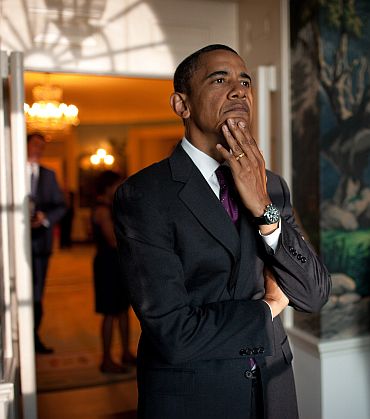
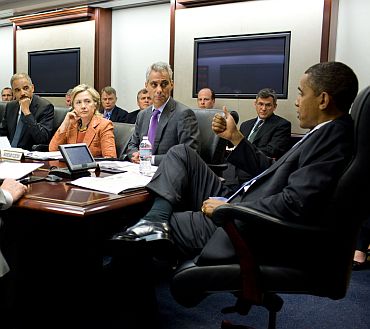
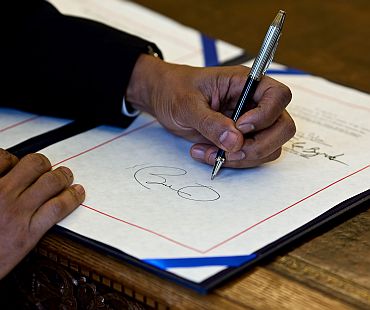
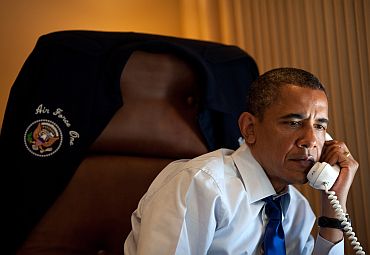
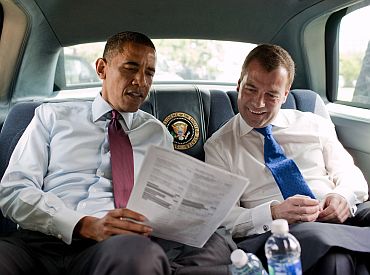
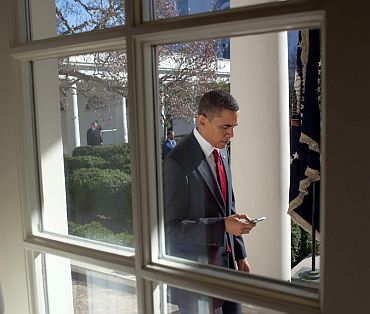
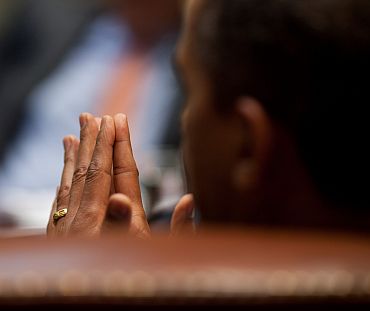

article